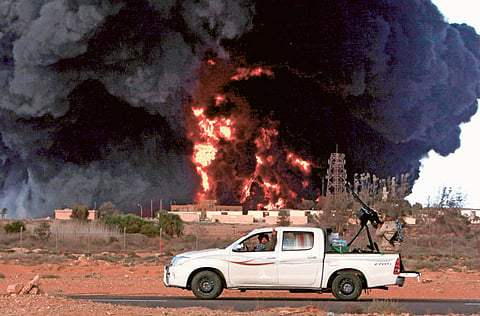Libyan leader Gaddafi seeks 'Israel's help'
Rebels claim aides to Libyan dictator met Israeli agents in chad to discuss deal

Dubai: Libyan revolutionaries claimed on Thursday that security officers representing Muammar Gaddafi's regime met with Israeli intelligence officials this week in Chad to discuss a deal to facilitate the movement of trained African mercenaries.
The meeting, according to the source, discussed the financial aspect of the deal and the method of payment.
"In principle, Israel has no objection to help Gaddafi to stay. On the other hand Gaddafi is willing to involve Israel in protecting his regime to evade the UN sanctions against his regime, including the expected no-fly zone," said Naim Ali, a member of the revolutionary forces in Benghazi.
"The payment will be made against arms supplies and intelligence services," he added.
He said revolutionaries have gathered evidence about the involvement of Israel in the operation.
"Yesterday one of the two snipers killed in Zawiyah was recruited by Israel. He has Israeli contacts in the mobile he was using," Ali said.
He said Gaddafi's statement during his interview with Turkish TRT television was part of the deal to show his commitment to the security of the Jewish state.
Gaddafi told the TV station that the unrest in Libya would spread all the way to Israel and to Europe if the revolutionaries — who he says represent Al Qaida — were allowed to rule Libya.
Paid to fight
Gaddafi also warned of the rising Al Qaida influence, saying that the rebellion that began on February 17 was carried out "at the behest of foreign militants belonging to Al Qaida, who paid young people money and released prisoners to join them in the fighting."
Israeli press warned against the increasing influence of anti-Semitic forces in the new transitional governments in both Egypt and Tunisia which have witnessed public revolutions resulted in overthrowing what has been tagged by both Israel and the west as moderate regimes.
Sign up for the Daily Briefing
Get the latest news and updates straight to your inbox


